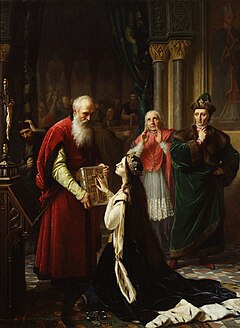Margaret of Audonia
| Margaret of Audonia | |
|---|---|
 Margaret affirms her Oath as Empress before the Archbishop of Montroi, painting dated to early 19th century | |
| Holy Audonian Empress | |
| Reign | 18 August 1394 – 9 May 1404[1] |
| Predecessor | Louis III |
| Successor | Henry I |
| Queen of Keld | |
| Reign | 18 August 1394 – 9 December 1410 |
| Predecessor | Louis I |
| Successor | Agnès |
| Co-monarch | Stephen |
| Born | 28 January 1359 Saint-Armand-du-Lac, Burgoy |
| Died | 9 December 1410 (aged 51) Ascanium, Latium |
| Burial | Archbasilica of Frébourg, Lyncanestria |
| Spouse | Stephen of Latium |
| Issue | |
| Father | Louis III |
| Mother | TBD |
Empress Margaret (28 January 1359 – 9 December 1410), also known as Marguerite, was one of the two rival claimants to the emperorship of the Audonian Empire during the civil war in Audonia, the other being her cousin Henry IV, Duke of Burgoy. She was the only child of the Emperor Louis III to survive infancy, and as such was raised from a young age to succeed to the throne. In 1371 she was married to Stephen, younger son of Theodora II of Latium, as a means of mending the rivalry between the two empires. By all accounts it was a happy marriage, though the match was widely unpopular among the Audonian nobility.
Despite her father's wishes, upon his passing in 1394, many nobles refused to acknowledge a female monarch and acclaimed her cousin the Duke of Burgoy as the rightful sovereign. Henry delayed raising arms against Margaret until mid-1395, when he raised an army and marched on Harcourt with the armies of the dukes of Renfort and Antenfoy. While the nobility were mostly evenly split between support for either claimant, the Fabrian Church in Audonia mostly backed Margaret. The civil war was mostly a stalemate, with Henry maintaining control of north and east Audonia, and Margaret's hold on power consolidated in the east and south. In 1401, Margaret was forced to leave her court of Hauteville after an eighteen-month siege by Henry's key ally the duke of Vanciènnes.
During her reign, Margaret was known by contemporaries to be a learned woman who chartered three universities, and patronized numerous chroniclers, artists and musicians. She was a renowned flautist who often entertained her court with her own playing. She wrote a treatise on the role of women in society and the church, promoting the example of Priscilla as to how women should be afforded the same authority as men should they merit it.
In 1404, following the disastrous battle of Hesbaye that resulted in the deaths of many nobles loyal to her including her only son and heir Prince Alexander, Margaret fled Audonia for Latium, where she never gave up her right to the throne and lived out the rest of her life in exile as a pretender. She died in 1410 of what modern scholars believe was tuberculosis. She was originally interred in Latium, but in 1543 her body was exhumed and reburied in Frébourg, under the high altar of the city's archbasilica.
Childhood
Princess Mary Margaret (Audonic: Marie Marguerite) was born on 28 January 1359 at the Château de Saint-Armand, in Saint-Armand-du-Lac in what is now Burgoy. Her father was the Holy Audonian Emperor, Louis III and her mother was [TBD]. She was the third of her mother's pregnancies as the prior two had resulted in stillbirths; her mother would become pregnant two more times after her, with those resulting in a stillbirth and live birth respectively—although her younger brother would die in infancy and not live to his christening. He would be posthumously named Louis Ignace.
The Emperor was said to have had much affection for his daughter and had begun to groom her for the throne from a young age given his lack of other children, despite the empire having observed agnatic succession since its inception. Margaret was placed under the tutelage of the learned Latin-born Bishop of Jugny, Caetanus [GENS?].
Marriage
Succession
Reign and civil war
Death and legacy
Footnotes
- ↑ End dates for her reign are disputed; claimant Henry IV, Duke of Burgoy took her capital of Hauteville in 1401, though Margaret did not flee Audonia for Latium until the battle of Hesbaye. She maintained her claim to the throne until her death in 1410.